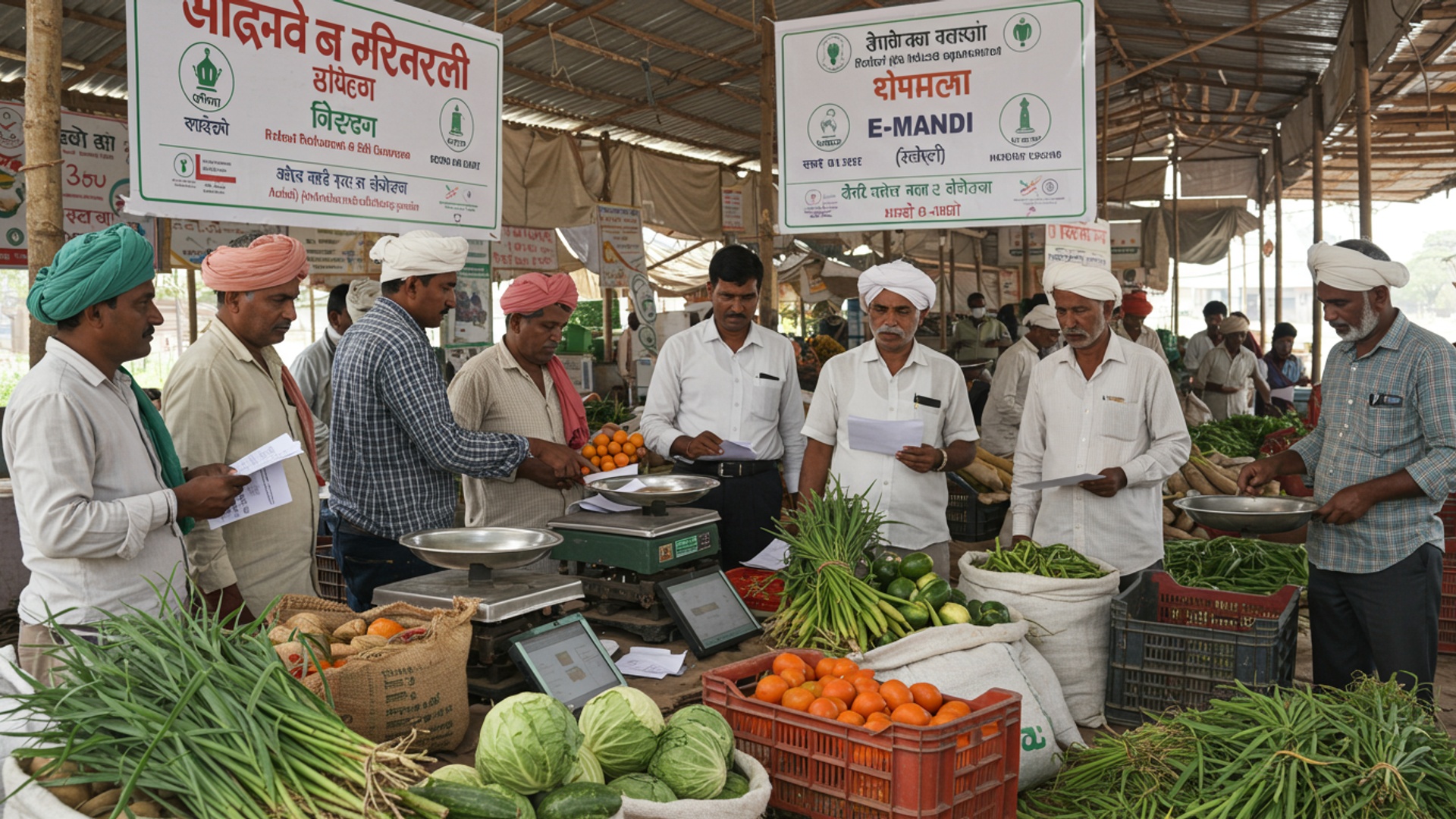Madhya Pradesh is fundamentally changing its farming landscape right now, rolling out a new e-Mandi system across all 259 markets. This major step allows over 2. 134 million registered farmers to sell their produce online, aiming for better prices and clearer deals directly from their farms or local markets. The move, which began as a pilot in 2021 and expanded rapidly, uses simple computer and mobile technology to make sure farmers get fair value for their hard work without delays, marking a big shift in how agricultural trade happens in the state. This digital push ensures real-time updates on sales and payments, making the entire process open and farmer-focused.
Digital Shift for Farmers
The central Indian state of Madhya Pradesh has brought about a significant change in its agricultural markets by fully rolling out a new digital trading system. This system, known as ‘e-Mandi’, is now active in all 259 markets across the state. This move aims to make selling farm produce easier and more open for farmers. The journey began with a small test project in just eight markets in 2021. The plan was to have all markets operating digitally by April 1, 2025, a goal that has now been reached. The traditional way of selling crops often caused problems for farmers. They faced limited access to wider markets, unclear prices. long chains of middlemen. These issues could lead to lower earnings and slow payments. The new digital system works to fix these old problems. It is part of a bigger national plan called e-NAM, which means “Electronic National Agriculture Market.” This national plan started in 2016 with a clear goal: “One Nation, One Market for Agricultural Produce.” The state government made crucial changes to its farming market law, called the Madhya Pradesh Krishi Upaj Mandi Act of 2020. These changes allow farmers to sell their crops directly from their homes or fields. They also made it so traders only need one license to buy crops anywhere in the state. These steps are vital for creating a fair and open buying and selling system for farmers.
Easier Selling with Technology
The introduction of the e-Mandi system has made the entire selling process much smoother for farmers. From the moment they enter the market until they complete the sale and get paid, the process is now largely digital. Farmers can know instantly which trader bought their produce and at what price. This details is sent directly to their mobile phones. Farmers no longer need to wait in long lines to get entry slips for their produce. They can now create these slips on their own mobile phones before they even reach the market. Once an entry slip is made, their details is saved, so they do not need to enter it again for future visits. This allows farmers to go directly to the auction area and sell their crops without delays. The bidding process, weighing of crops. payments are all handled by computer systems. This helps to make sure everything is done correctly and openly. Farmers get updates on auctions right on their mobile phones.
“Today, farmers experience a seamless process from market entry to contracting, selling, certification, licensing. clearance. They can instantly track which trader purchased their produce and at what price. This digital transformation has streamlined workflows, increased efficiency. removed delays and redundant processes, resulting in a more agile and effective market system.”
The system also sends farmers instant updates through SMS and WhatsApp messages after their entry, contract, weighing. payment. This way, farmers always know what is happening with their produce.
Connecting Farmers and Buyers
A major benefit of the new digital platform is its ability to connect farmers with more buyers, not just those in their local market. This wider reach can lead to better prices for their crops because more buyers can compete. The online bidding system, where many buyers can place offers anonymously, helps to reduce unfair practices among traders. The system works to ensure that payments are made on time directly to the farmers. All payment records are kept digitally, making it easier for market groups to check and ensure that farmers receive their money quickly. A special mobile application, the ‘MP Farm Gate App’, gives farmers even more freedom. This app allows them to sell their produce directly from their home, farm, or storage place at a price they decide. They do not have to go to the market yard. So far, a large number of farmers have used this app to sell their crops.
| Feature | Details |
| Farmers registered in scheme | Over 2. 134 million |
| Traders using E-License system | More than 64,000 |
| Total E-Licenses issued | Over 11. 357 million (9. 4 million by traders) |
| Farmers using MP Farm Gate App | Over 679,000 |
| Crops sold via MP Farm Gate App | 77. 1 million quintals |
The MP Farm Gate App has enabled a significant amount of trade. For example, in August 2023, nearly 20,000 farmers used it to sell 13. 4 million quintals of crops. This shows how much the app has helped farmers sell their produce from their own locations, saving them money on transport and reducing losses.
New Ways for Traders
Traders also benefit from these digital changes. The ‘E-License system’ allows them to create their own passes for moving purchased crops. This has almost removed the need for market workers to issue licenses by hand. This digital way of working has greatly improved how records are kept. With digital tools, traders can easily access their payment records using secure digital IDs. They just need to confirm their payment entries. This streamlined process makes the whole market system faster and more effective.
“According to Mr. Kumar Purushottam, more than 64,000 market traders across Madhya Pradesh are now using the E-License system to generate their own gate passes for transporting purchased produce. As a result, manual license issuance by market employees has been reduced to almost zero.”
Overcoming Roadblocks
Even with all these positive changes, there are some roadblocks to making the digital market work for everyone. One common problem is that some farmers may not know enough about how to use these new technologies or how the digital market system works. This can make it hard for them to use the e-Mandi platform fully. There are also challenges with basic things like having enough storage places, good transport. reliable internet in rural areas. Sometimes, farmers also have worries about trusting digital payment systems instead of getting cash right away. Efforts are being made to help farmers learn more about the new system through training and education, especially in their local languages. This is vital to help more farmers join and benefit from digital trading. While large and medium-sized farmers have quickly adopted these digital platforms, getting small farmers to use them is still a work in progress in some areas. Despite these challenges, the state’s efforts to digitalize agricultural markets have been recognized. The e-Mandi scheme received the prestigious Scotch Order of Merit Award in 2023 for its work in making farming better. The system was built with help from the National Informatics Centre (NIC). ![]()










